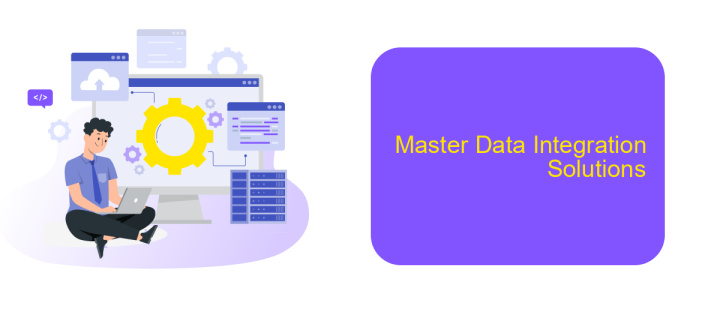Master Data Integration
Master Data Integration (MDI) is a critical process that ensures the consistency and accuracy of an organization's core data across various systems and applications. By integrating master data, businesses can eliminate data silos, enhance decision-making, and streamline operations. This article explores the key principles, challenges, and benefits of implementing effective MDI strategies to drive business success.
Abstract
Master Data Integration (MDI) is a crucial aspect of modern data management, enabling organizations to consolidate and harmonize data from diverse sources. Effective MDI ensures data consistency, accuracy, and accessibility, which are essential for informed decision-making and operational efficiency.
- Centralized data management
- Improved data quality and accuracy
- Enhanced data accessibility and sharing
- Streamlined business processes
Tools like ApiX-Drive facilitate seamless integration by connecting various data sources and automating data synchronization. This not only reduces manual efforts but also minimizes errors, ensuring reliable data flow across systems. By leveraging such services, businesses can achieve robust MDI, leading to better insights and optimized operations.
Introduction

Master Data Integration is a critical component in modern data management strategies, enabling organizations to consolidate, manage, and utilize their core data assets effectively. By integrating master data from various sources, businesses can ensure consistency, accuracy, and accessibility across all departments. This process not only enhances decision-making but also drives operational efficiency and customer satisfaction.
To streamline the integration of master data, various tools and services are available, such as ApiX-Drive. ApiX-Drive offers a seamless solution for connecting different data sources and automating data flows, thereby reducing manual intervention and minimizing errors. With its user-friendly interface and robust capabilities, ApiX-Drive empowers organizations to achieve a unified view of their data, facilitating better insights and more informed business decisions.
Master Data Integration Challenges

Master Data Integration (MDI) poses several challenges that organizations must address to ensure seamless data flow and consistency. One of the primary challenges is data quality and standardization. Integrating data from various sources often results in inconsistencies, duplicates, and errors, which can compromise the integrity of the master data.
- Data Quality: Ensuring data accuracy, completeness, and consistency across all integrated systems.
- Scalability: Handling increasing data volumes and complexity as the organization grows.
- Security: Protecting sensitive data during transfer and integration processes.
- Real-time Integration: Achieving real-time data synchronization to support timely decision-making.
- Compliance: Adhering to regulatory requirements and industry standards for data management.
To overcome these challenges, organizations can leverage integration platforms like ApiX-Drive. ApiX-Drive simplifies the integration process by providing pre-built connectors and automated workflows, ensuring data is accurately synchronized across systems. By using such tools, companies can enhance data quality, improve scalability, and ensure compliance, thereby optimizing their MDI efforts.
Master Data Integration Solutions

Master Data Integration Solutions are essential for businesses aiming to synchronize and manage their core data across various systems. These solutions ensure that data is consistent, accurate, and accessible, thus enhancing decision-making and operational efficiency.
One of the most effective ways to achieve seamless master data integration is by utilizing specialized tools and services. These tools automate the process of data synchronization, reducing manual effort and minimizing errors. For example, ApiX-Drive offers a robust platform that facilitates the integration of multiple systems, allowing for real-time data updates and streamlined workflows.
- Automated data synchronization
- Real-time data updates
- Streamlined workflows
- Reduced manual effort
- Minimized errors
By leveraging solutions like ApiX-Drive, businesses can ensure their master data is always up-to-date and reliable. This not only improves data quality but also enables more informed decision-making, ultimately driving business growth and efficiency.
Conclusion
Master Data Integration is crucial for ensuring consistency, accuracy, and reliability across an organization's various data systems. By integrating master data, businesses can streamline operations, enhance decision-making processes, and reduce redundancies. Effective integration requires a strategic approach, leveraging advanced tools and technologies to align data from disparate sources into a unified, coherent structure.
Services like ApiX-Drive play a pivotal role in facilitating seamless master data integration. ApiX-Drive offers robust solutions for automating data synchronization and ensuring real-time updates across multiple platforms. By utilizing such services, organizations can significantly reduce the complexity and time associated with manual data integration, allowing them to focus on core business objectives and drive innovation. Ultimately, mastering data integration not only enhances operational efficiency but also provides a solid foundation for sustained business growth.
FAQ
What is Master Data Integration?
Why is Master Data Integration important?
What challenges are commonly faced during Master Data Integration?
How can automation help in Master Data Integration?
What are the best practices for successful Master Data Integration?
Time is the most valuable resource for business today. Almost half of it is wasted on routine tasks. Your employees are constantly forced to perform monotonous tasks that are difficult to classify as important and specialized. You can leave everything as it is by hiring additional employees, or you can automate most of the business processes using the ApiX-Drive online connector to get rid of unnecessary time and money expenses once and for all. The choice is yours!

